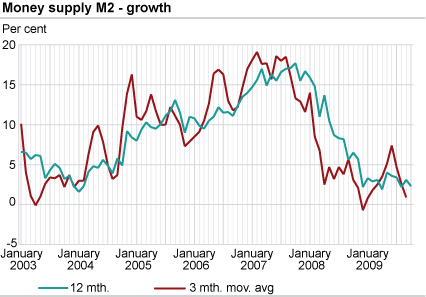Content
Published:
This is an archived release.
Slight reduction in money supply growth
The twelve-month growth in total money supply was 2.3 per cent to end-October, down from 3.1 per cent to end-September. The decrease in the M2 growth came from other financial enterprises.
The money supply amounted to NOK 1 519 billion at end-October, up from NOK 1 506 billion at end-September.
Reduced growth in the money supply from other financial enterprises
Other financial enterprises’ money supply (other than state lending institutions, banks and money market funds) amounted to NOK 132 billion at end-October. The twelve-month growth was -16.8 per cent to end-October, down from -0.3 per cent to the previous month.
Rise in non-financial enterprise money supply growth
Non-financial enterprises’ money supply amounted to NOK 511 billion at end-October. The twelve-month growth was 2.5 per cent to end-October, up from -0.3 per cent to the previous month. Non-financial enterprises’ money supply constituted 43.6 per cent of their gross domestic debt measured by the credit indicator C2 at end-October. As recently as in December 2007 this ratio was higher than 50 per cent.
Household money supply growth unchanged
At end-October, more than half (NOK 818 billion) of the broad monetary aggregate was owned by households. The twelve-month growth in household money supply was 5.7 per cent to end-October, the same as the previous month. The growth in household money supply was lower than the growth in household gross domestic debt, which was 6.7 per cent to end-October, as shown by the credit indicator C2 . For more information on the financial position of households, see the financial accounts in the national accounts .
| May 2009 | June 2009 | July 2009 | August 2009 | September 2009 | October 2009 | ||||||||||||||||||||||||||||||||||
|---|---|---|---|---|---|---|---|---|---|---|---|---|---|---|---|---|---|---|---|---|---|---|---|---|---|---|---|---|---|---|---|---|---|---|---|---|---|---|---|
| M0 - 12 mth. | 72.1 | 59.1 | 116.1 | 18.7 | 22.7 | -21.2 | |||||||||||||||||||||||||||||||||
| M1 - 12 mth. | -1.3 | -1.8 | -0.5 | -2.0 | 1.7 | 5.2 | |||||||||||||||||||||||||||||||||
| M2 - 12 mth. | 4.0 | 3.6 | 3.4 | 2.2 | 3.1 | 2.3 | |||||||||||||||||||||||||||||||||
| M2 - 3 mth. moving average | 5.1 | 7.4 | 4.7 | 2.6 | 0.9 | ||||||||||||||||||||||||||||||||||
| M2 households - 12 mth. | 6.2 | 5.9 | 5.9 | 5.7 | 5.7 | 5.7 | |||||||||||||||||||||||||||||||||
| M2 non-financial enterprises - 12 mth. | 2.7 | 1.6 | 2.4 | -0.8 | -0.3 | 2.5 | |||||||||||||||||||||||||||||||||
Negative growth in base money
Base money (see below) amounted to NOK 114 billion at end-October, up from NOK 105 billion at end-September. The twelve-month growth in the base money was -21.2 per cent to end-October, down from 22.7 per cent to the previous month. This decrease is connected to a larger increase in the bank deposits in Norges Bank in October 2008 than in October 2009 (base effect).
|
The money supply (broad monetary aggregate) M2 consists of notes and coins, unrestricted bank deposits, certificates of deposit and units in money market funds owned by the money-holding sector i.e. households, non-financial enterprises, municipalities and financial enterprises other than state lending institutions, banks and money market funds. The base money (M0) is defined as the banks’ and the money-holding sector's (see above) notes and coins and deposits with Norges Bank. Banks’ deposits with Norges Bank comprise current account (sight) deposits and fixed rate (time) deposits (F-deposits), from Norges Bank’s monthly balance sheet. |
The statistics is published with Monetary aggregates.
Contact
-
Statistics Norway's Information Centre
E-mail: informasjon@ssb.no
tel.: (+47) 21 09 46 42

